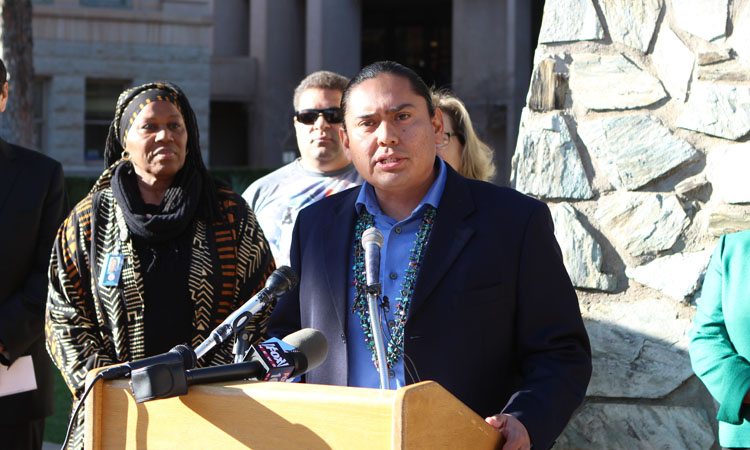Two days after the Cleveland Indians announced that the Chief Wahoo logo would be retired in 2019, local politicians said they hope to limit disparaging professional sports team logos from appearing in publicly funded sports venues.
Arizona State Rep. Eric Descheenie announced in a press conference Wednesday that House Bill 2499, if passed, would disallow publicly funded sports facilities in Arizona from displaying the name “Redskins” in association with the Washington D.C. NFL franchise.
The team is scheduled to play the Arizona Cardinals in University of Phoenix Stadium in 2018.
“This is not about free speech, it is about government speech,” said Descheenie, a Navajo from Chinle. “This bill begins and ends with government-owned facilities.”
Joining Rep. Descheenie was Navajo Nation vice president Jonathan Nez, Amanda Blackhorse, lead plaintiff in Blackhorse vs. Pro Football Inc., and Rep. Geraldine Peten.
“If a football team, in this case the NFL football team the Redskins, is going to be playing in some of these stadiums,” Nez said, “is that the same speech that is being used by our state government?”
The bill still faces uncertainty and Descheene noted that it could be a long shot that the bill actually does become law.
Amanda Tachine, Postdoctoral Scholar at the Center for Indian Education at Arizona State University, said that Bill 2499 at the very least gives hope for a better future.
“I feel really good about the bill. I feel like it is a courageous step towards the continuing efforts to really stop racist occurrences that happen in our society,” Tachine said. “I think that it really starts a conversation (about what) all states could really do to close the door on these racist behaviors.”
This news comes two days after the Cleveland Indians announced that they would no longer use the Chief Wahoo logo starting in 2019. While Tachine notes that it is a positive step, there is still work to do.
“I applaud Cleveland in taking efforts to not include that caricature, that image, but they still have Indians as part of the name that they will still profit from,” Techine said.
Techine isn’t the only one who believes that the Native American community still has a far way to go to get the relationship between Native Americans and non-Native Americans to a place of unity.
“I believe the state of Arizona has a bright future once it begins to gain a conscience,” Descheenie said.
Hurdles remain. A question raised during the press conference was the notion that if one of the 22 tribes in Arizona finds offense to a name, will that name be banned from being used at a publicly funded sports venue?
“These are tribal sovereign nations that preexist the United States of America,” Descheenie said. “Whatever their opinion is, I think carries a great deal of weight. If one tribe is offended, that is one too many.”




